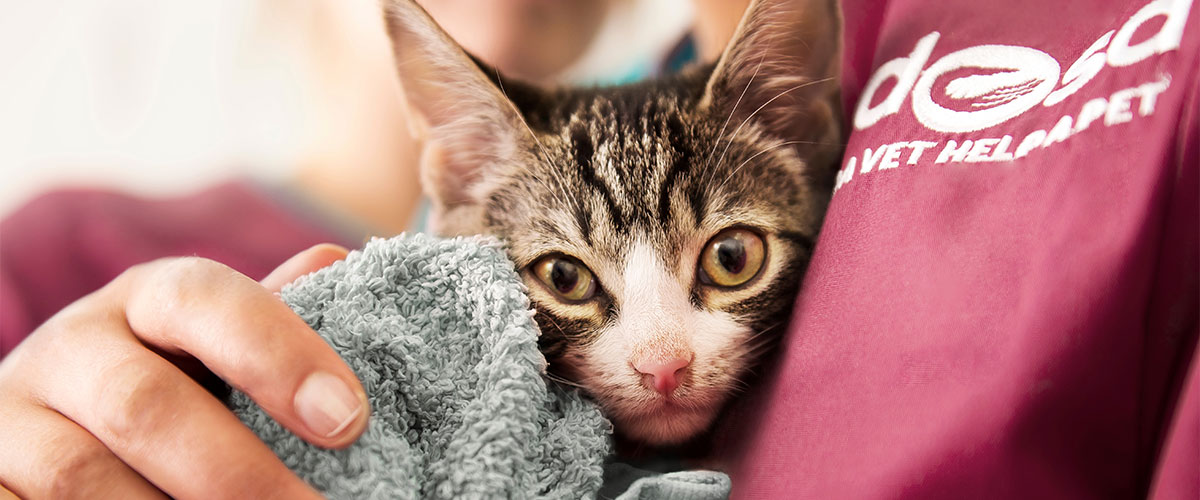Feline panleukopenia (FPV)
Overview
- Feline panleukopenia (also known as FPV, feline parvovirus and feline infectious enteritis), is a nasty virus that attacks the guts and immune system (similar to parvovirus in dogs).
- FPV spreads from cat to cat, and can pass to kittens in the womb.
- Symptoms of FPV include vomiting, diarrhoea and sometimes, sudden death.
- There is no specific cure for FPV, instead, treatment involves supporting your cat with fluids and medicines while their body fights the infection.
- Vaccinate your cat regularly to protect them from FPV.
What is FPV?
Feline panleukopenia (also known as FPV, feline parvovirus and feline infectious enteritis), is a nasty virus that attacks the guts, immune system and sometimes, the heart. Sadly, FPV often causes severe illness and sometimes death. Young kittens with FPV often suffer more serious symptoms than adult cats, and if a pregnant cat contracts FPV, her kittens may be born with brain damage (wobbly kitten syndrome).
Cats can catch FPV by coming into contact with an infected cat, or touching an item that an infected cat has touched. FPV does not affect dogs or humans.
Fortunately, we can vaccinate our cats against FPV.
Symptoms
Symptoms of FPV vary a lot, but can include:
- Vomiting
- Diarrhoea (sometimes containing blood)
- High temperature
- Lethargy (weakness)
- Loss of appetite
- Stomach pain (hunching, growling, hiding away)
- Wobbly kittens – due to brain damage.

Diarrhoea (containing blood) from a cat with FPV
When to contact your vet
Contact your vet if your cat is showing any of the symptoms of FPV, especially if they’re young or unvaccinated.
Find out whether you are eligible for free or low cost PDSA veterinary treatment by visiting our eligibility checker.
Treatment
If your cat has a very mild FPV infection, your vet may be able give out medication and advice for you to treat them at home. If your cat has a more serious case of FPV, they will need to be admitted to a veterinary hospital for treatment. There is no specific medicine to treat FPV and antibiotics don’t work because it’s a virus (not a bacteria). Instead, treatment involves supporting the body while it fights the FPV virus:
- Intensive nursing and feeding. Your cat may need intensive nursing in a veterinary hospital to keep them clean, warm, fed and hydrated. If your cat can’t or won’t eat, they may need to be fed through a stomach tube. They will also need to be isolated from other cats to prevent them from picking up any other infections and stop FPV spreading.
- A fluid drip. Your cat may need a fluid drip (fluids given straight into the blood stream) to stop them becoming dangerously dehydrated and replace the fluids they lose in their diarrhoea/vomit.
- Antibiotics. Antibiotics may be necessary to protect your cat against other infections during their recovery (but won’t kill FPV).
- Other medications. Other medications such as anti-sickness and stomach ulcer medication may be necessary.
If your cat recovers and returns home, your vet will tell you how to nurse them back to full health again.
Ongoing care and outlook
A young or weak kitten is much more likely to die from FPV than an older cat that has some immunity/protection.
Cats that recover from FPV tend to return to living a normal life.
Kittens that catch FPV in the womb often have balance and coordination problems (wobbly kitten syndrome). Fortunately, although these kittens tend to be very clumsy, they usually adapt well and live a happy life.
Prevention
Vaccination. FPV vaccination has meant that FPV is much rarer than it used to be, but unvaccinated cats are still at risk so make sure you protect your kitten/cat with regular vaccinations throughout life.
Don’t let your kitten go outside or mix with other cats until they has been vaccinated – FPV can survive in the environment for several months.
If your cat has been diagnosed with FPV, don’t let them mix with other cats until they are 100% healthy again.

Vaccinate and give regular boosters against FPV
Cost
Treatment for FPV can become very expensive, especially if they need intensive care in a veterinary hospital. It’s very important to speak openly to your vet about your finances, the cost of treatment, as well as what you think is right for your cat. There are often several treatment options so if one doesn’t work for you and your pet then the vet may be able to offer another.
When you welcome a new cat into your life, consider getting Cat Insurance before any signs of illness start. This will give you peace of mind that you have some financial support if they ever get sick.
Published: April 2020
Did you find this page useful?
Tell us more
Please note, our vets and nurses are unable to respond to questions via this form. If you are concerned about your pet’s health, please contact your vet directly.
Thank you for your feedback
Want to hear more about PDSA and get pet care tips from our vet experts?
Sign up to our e-newsletter
Written by vets and vet nurses. This advice is for UK pets only. Illustrations by Samantha Elmhurst.

